Report on Contract and Negligence in Business Law (Module ABC)
VerifiedAdded on 2020/01/16
|14
|4257
|170
Report
AI Summary
This report provides a comprehensive overview of contract law and negligence within a business context. It begins by defining the essential elements of a contract, including offer, acceptance, consideration, intention to create legal relations, and capacity, and then explores different types of contracts such as face-to-face, express and implied, distance selling, and bilateral and unilateral contracts. The report also examines the terms in a contract, differentiating between implied, express, and innominate terms, with examples of conditions and warranties. Case studies, including scenarios involving Ivan, Adam and Brian, and Barry, are used to illustrate the application of contract principles. Furthermore, the report contrasts liability in tort with contractual liability and delves into the nature of liability in negligence, including vicarious liability, with a case study of Mark. Overall, the report aims to provide a clear understanding of contracts and negligence in business law.
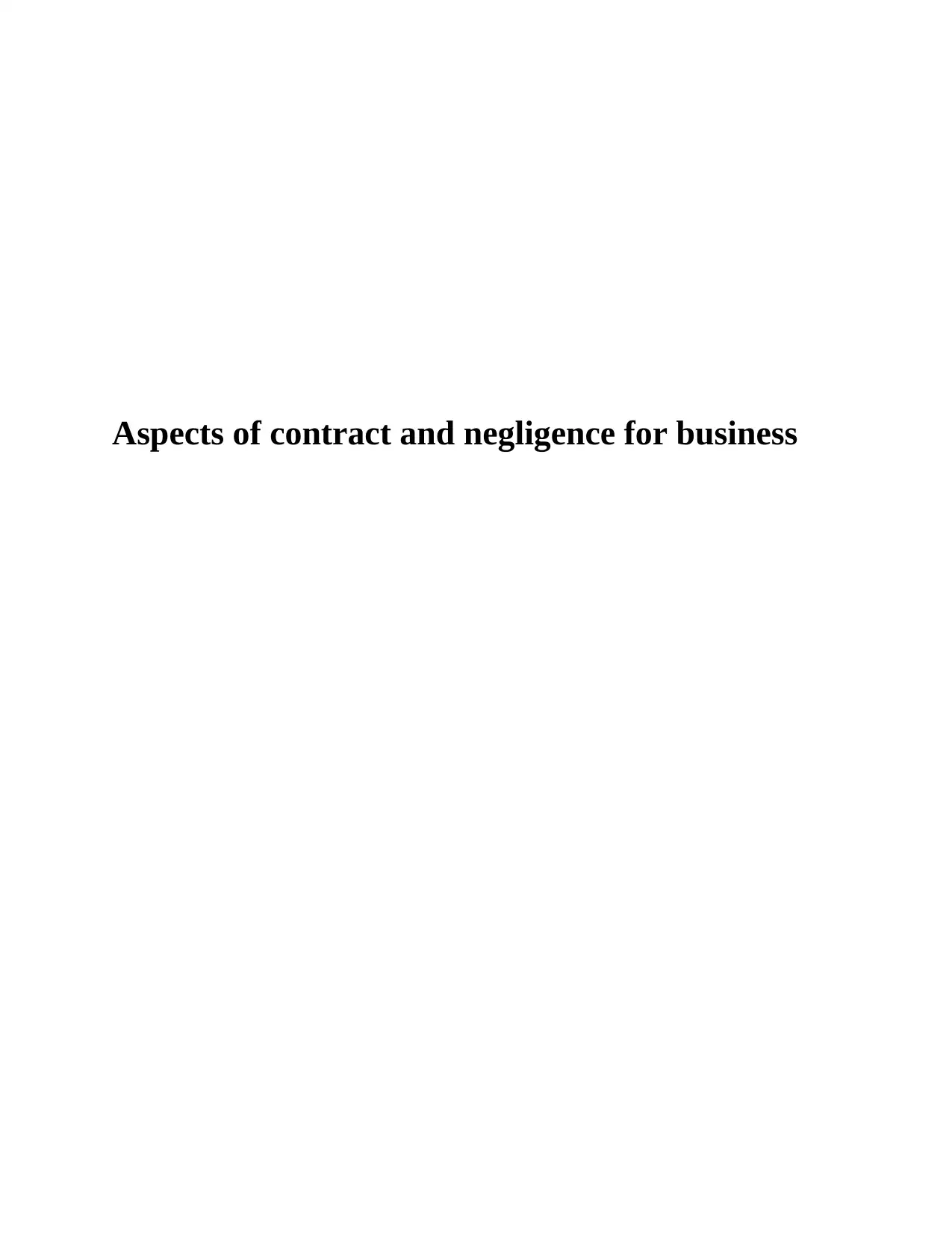
Aspects of contract and negligence for business
Paraphrase This Document
Need a fresh take? Get an instant paraphrase of this document with our AI Paraphraser
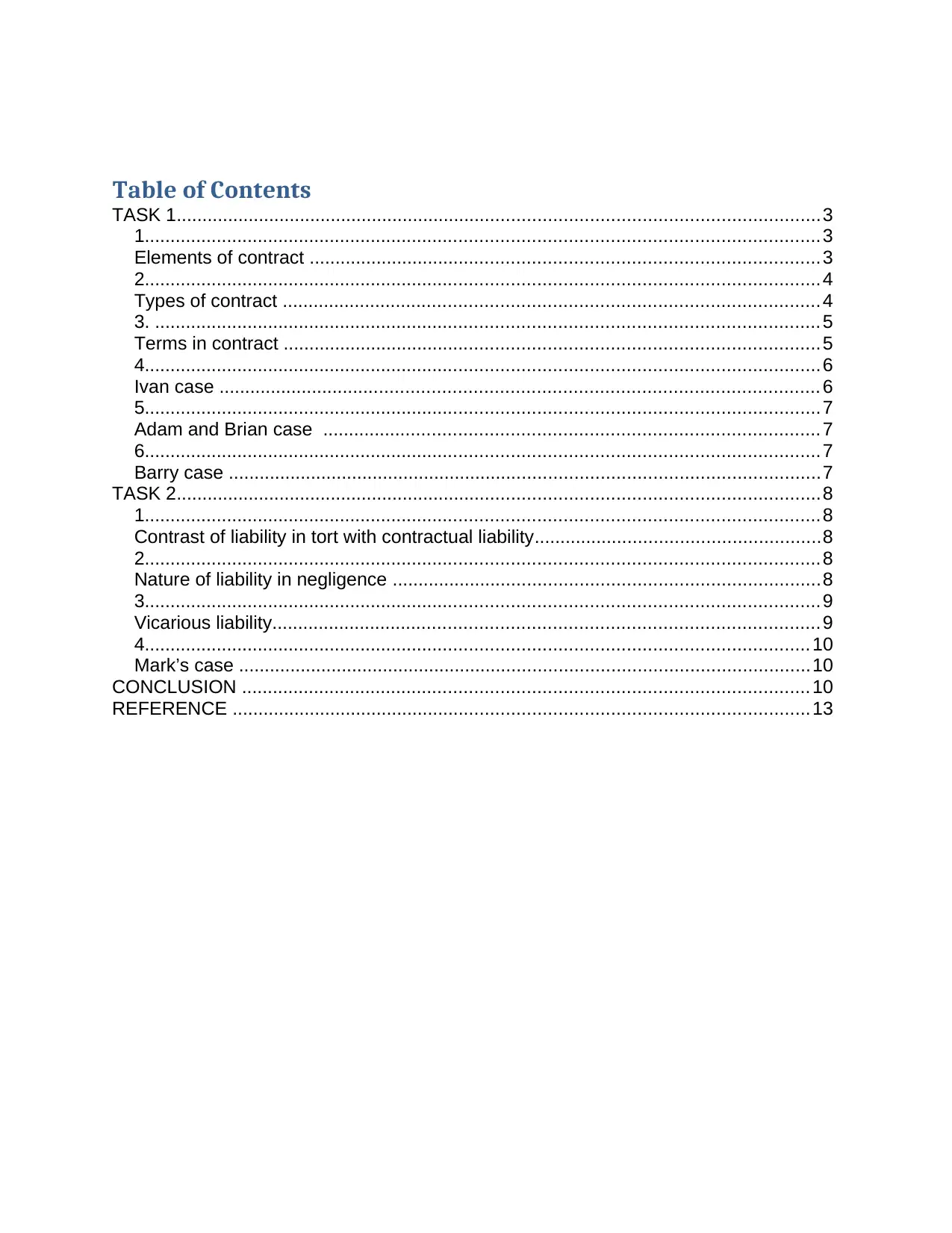
Table of Contents
TASK 1............................................................................................................................3
1..................................................................................................................................3
Elements of contract ..................................................................................................3
2..................................................................................................................................4
Types of contract .......................................................................................................4
3. ................................................................................................................................5
Terms in contract .......................................................................................................5
4..................................................................................................................................6
Ivan case ................................................................................................................... 6
5..................................................................................................................................7
Adam and Brian case ...............................................................................................7
6..................................................................................................................................7
Barry case ..................................................................................................................7
TASK 2............................................................................................................................8
1..................................................................................................................................8
Contrast of liability in tort with contractual liability.......................................................8
2..................................................................................................................................8
Nature of liability in negligence ..................................................................................8
3..................................................................................................................................9
Vicarious liability.........................................................................................................9
4................................................................................................................................10
Mark’s case ..............................................................................................................10
CONCLUSION .............................................................................................................10
REFERENCE ...............................................................................................................13
TASK 1............................................................................................................................3
1..................................................................................................................................3
Elements of contract ..................................................................................................3
2..................................................................................................................................4
Types of contract .......................................................................................................4
3. ................................................................................................................................5
Terms in contract .......................................................................................................5
4..................................................................................................................................6
Ivan case ................................................................................................................... 6
5..................................................................................................................................7
Adam and Brian case ...............................................................................................7
6..................................................................................................................................7
Barry case ..................................................................................................................7
TASK 2............................................................................................................................8
1..................................................................................................................................8
Contrast of liability in tort with contractual liability.......................................................8
2..................................................................................................................................8
Nature of liability in negligence ..................................................................................8
3..................................................................................................................................9
Vicarious liability.........................................................................................................9
4................................................................................................................................10
Mark’s case ..............................................................................................................10
CONCLUSION .............................................................................................................10
REFERENCE ...............................................................................................................13
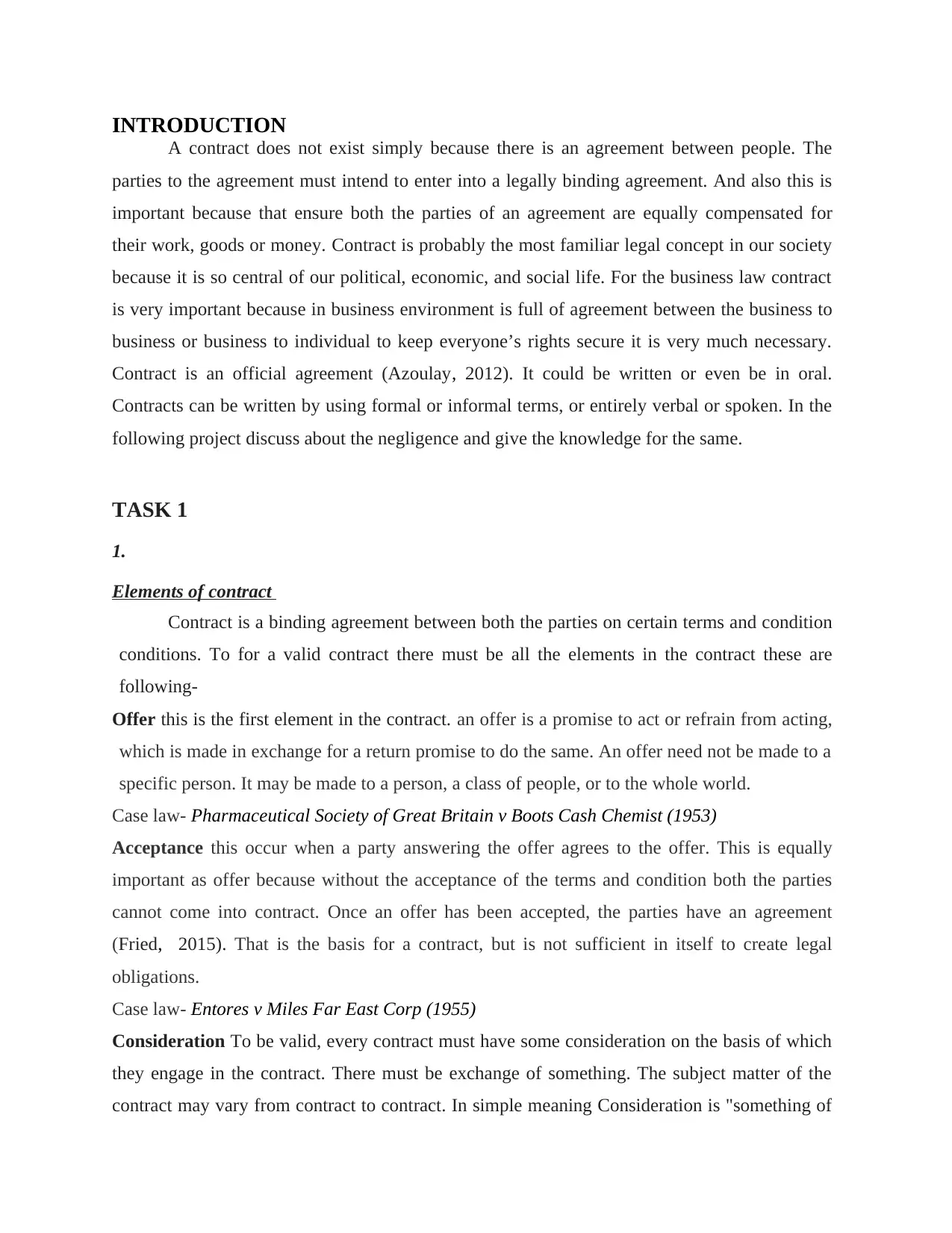
INTRODUCTION
A contract does not exist simply because there is an agreement between people. The
parties to the agreement must intend to enter into a legally binding agreement. And also this is
important because that ensure both the parties of an agreement are equally compensated for
their work, goods or money. Contract is probably the most familiar legal concept in our society
because it is so central of our political, economic, and social life. For the business law contract
is very important because in business environment is full of agreement between the business to
business or business to individual to keep everyone’s rights secure it is very much necessary.
Contract is an official agreement (Azoulay, 2012). It could be written or even be in oral.
Contracts can be written by using formal or informal terms, or entirely verbal or spoken. In the
following project discuss about the negligence and give the knowledge for the same.
TASK 1
1.
Elements of contract
Contract is a binding agreement between both the parties on certain terms and condition
conditions. To for a valid contract there must be all the elements in the contract these are
following-
Offer this is the first element in the contract. an offer is a promise to act or refrain from acting,
which is made in exchange for a return promise to do the same. An offer need not be made to a
specific person. It may be made to a person, a class of people, or to the whole world.
Case law- Pharmaceutical Society of Great Britain v Boots Cash Chemist (1953)
Acceptance this occur when a party answering the offer agrees to the offer. This is equally
important as offer because without the acceptance of the terms and condition both the parties
cannot come into contract. Once an offer has been accepted, the parties have an agreement
(Fried, 2015). That is the basis for a contract, but is not sufficient in itself to create legal
obligations.
Case law- Entores v Miles Far East Corp (1955)
Consideration To be valid, every contract must have some consideration on the basis of which
they engage in the contract. There must be exchange of something. The subject matter of the
contract may vary from contract to contract. In simple meaning Consideration is "something of
A contract does not exist simply because there is an agreement between people. The
parties to the agreement must intend to enter into a legally binding agreement. And also this is
important because that ensure both the parties of an agreement are equally compensated for
their work, goods or money. Contract is probably the most familiar legal concept in our society
because it is so central of our political, economic, and social life. For the business law contract
is very important because in business environment is full of agreement between the business to
business or business to individual to keep everyone’s rights secure it is very much necessary.
Contract is an official agreement (Azoulay, 2012). It could be written or even be in oral.
Contracts can be written by using formal or informal terms, or entirely verbal or spoken. In the
following project discuss about the negligence and give the knowledge for the same.
TASK 1
1.
Elements of contract
Contract is a binding agreement between both the parties on certain terms and condition
conditions. To for a valid contract there must be all the elements in the contract these are
following-
Offer this is the first element in the contract. an offer is a promise to act or refrain from acting,
which is made in exchange for a return promise to do the same. An offer need not be made to a
specific person. It may be made to a person, a class of people, or to the whole world.
Case law- Pharmaceutical Society of Great Britain v Boots Cash Chemist (1953)
Acceptance this occur when a party answering the offer agrees to the offer. This is equally
important as offer because without the acceptance of the terms and condition both the parties
cannot come into contract. Once an offer has been accepted, the parties have an agreement
(Fried, 2015). That is the basis for a contract, but is not sufficient in itself to create legal
obligations.
Case law- Entores v Miles Far East Corp (1955)
Consideration To be valid, every contract must have some consideration on the basis of which
they engage in the contract. There must be exchange of something. The subject matter of the
contract may vary from contract to contract. In simple meaning Consideration is "something of
⊘ This is a preview!⊘
Do you want full access?
Subscribe today to unlock all pages.

Trusted by 1+ million students worldwide
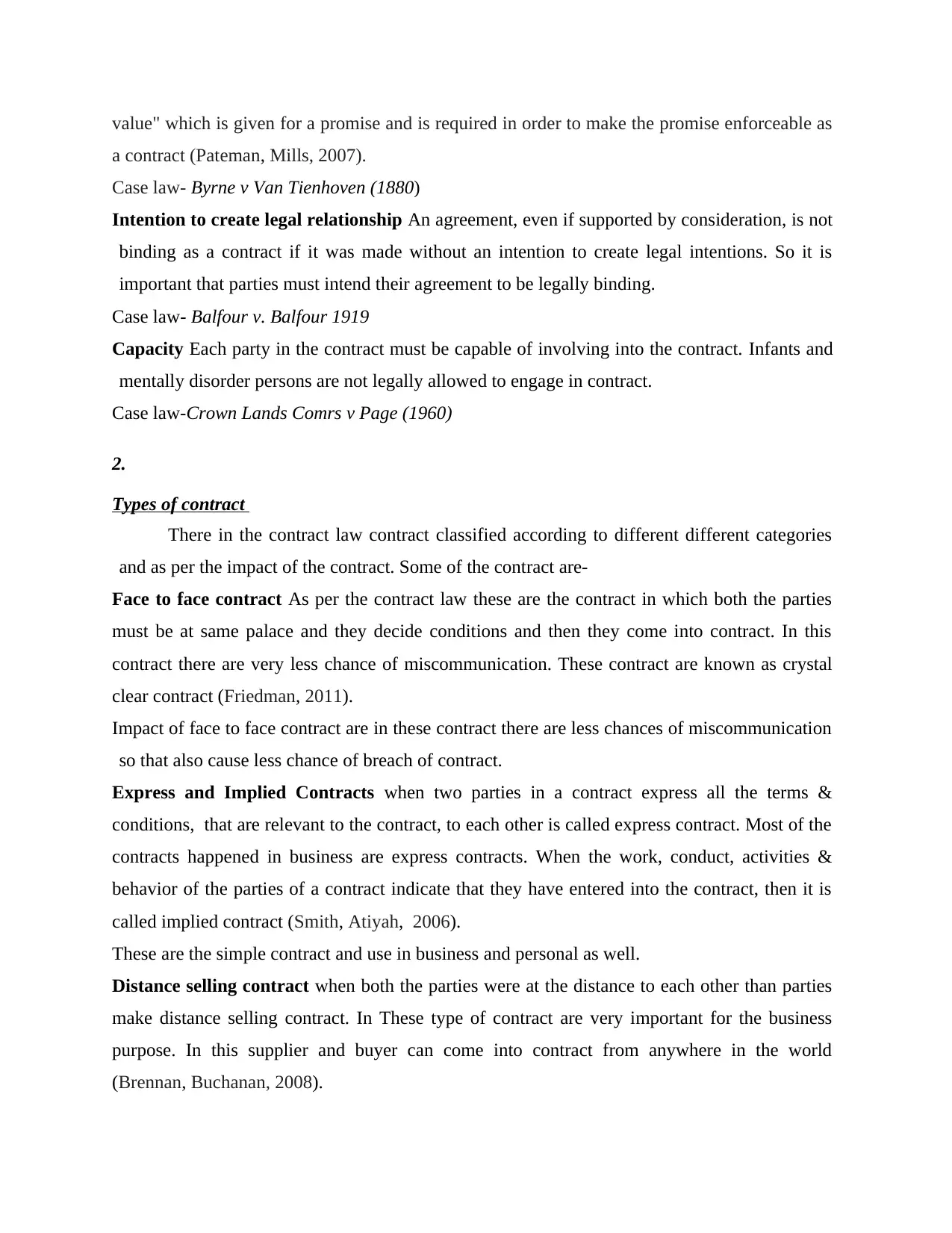
value" which is given for a promise and is required in order to make the promise enforceable as
a contract (Pateman, Mills, 2007).
Case law- Byrne v Van Tienhoven (1880)
Intention to create legal relationship An agreement, even if supported by consideration, is not
binding as a contract if it was made without an intention to create legal intentions. So it is
important that parties must intend their agreement to be legally binding.
Case law- Balfour v. Balfour 1919
Capacity Each party in the contract must be capable of involving into the contract. Infants and
mentally disorder persons are not legally allowed to engage in contract.
Case law-Crown Lands Comrs v Page (1960)
2.
Types of contract
There in the contract law contract classified according to different different categories
and as per the impact of the contract. Some of the contract are-
Face to face contract As per the contract law these are the contract in which both the parties
must be at same palace and they decide conditions and then they come into contract. In this
contract there are very less chance of miscommunication. These contract are known as crystal
clear contract (Friedman, 2011).
Impact of face to face contract are in these contract there are less chances of miscommunication
so that also cause less chance of breach of contract.
Express and Implied Contracts when two parties in a contract express all the terms &
conditions, that are relevant to the contract, to each other is called express contract. Most of the
contracts happened in business are express contracts. When the work, conduct, activities &
behavior of the parties of a contract indicate that they have entered into the contract, then it is
called implied contract (Smith, Atiyah, 2006).
These are the simple contract and use in business and personal as well.
Distance selling contract when both the parties were at the distance to each other than parties
make distance selling contract. In These type of contract are very important for the business
purpose. In this supplier and buyer can come into contract from anywhere in the world
(Brennan, Buchanan, 2008).
a contract (Pateman, Mills, 2007).
Case law- Byrne v Van Tienhoven (1880)
Intention to create legal relationship An agreement, even if supported by consideration, is not
binding as a contract if it was made without an intention to create legal intentions. So it is
important that parties must intend their agreement to be legally binding.
Case law- Balfour v. Balfour 1919
Capacity Each party in the contract must be capable of involving into the contract. Infants and
mentally disorder persons are not legally allowed to engage in contract.
Case law-Crown Lands Comrs v Page (1960)
2.
Types of contract
There in the contract law contract classified according to different different categories
and as per the impact of the contract. Some of the contract are-
Face to face contract As per the contract law these are the contract in which both the parties
must be at same palace and they decide conditions and then they come into contract. In this
contract there are very less chance of miscommunication. These contract are known as crystal
clear contract (Friedman, 2011).
Impact of face to face contract are in these contract there are less chances of miscommunication
so that also cause less chance of breach of contract.
Express and Implied Contracts when two parties in a contract express all the terms &
conditions, that are relevant to the contract, to each other is called express contract. Most of the
contracts happened in business are express contracts. When the work, conduct, activities &
behavior of the parties of a contract indicate that they have entered into the contract, then it is
called implied contract (Smith, Atiyah, 2006).
These are the simple contract and use in business and personal as well.
Distance selling contract when both the parties were at the distance to each other than parties
make distance selling contract. In These type of contract are very important for the business
purpose. In this supplier and buyer can come into contract from anywhere in the world
(Brennan, Buchanan, 2008).
Paraphrase This Document
Need a fresh take? Get an instant paraphrase of this document with our AI Paraphraser
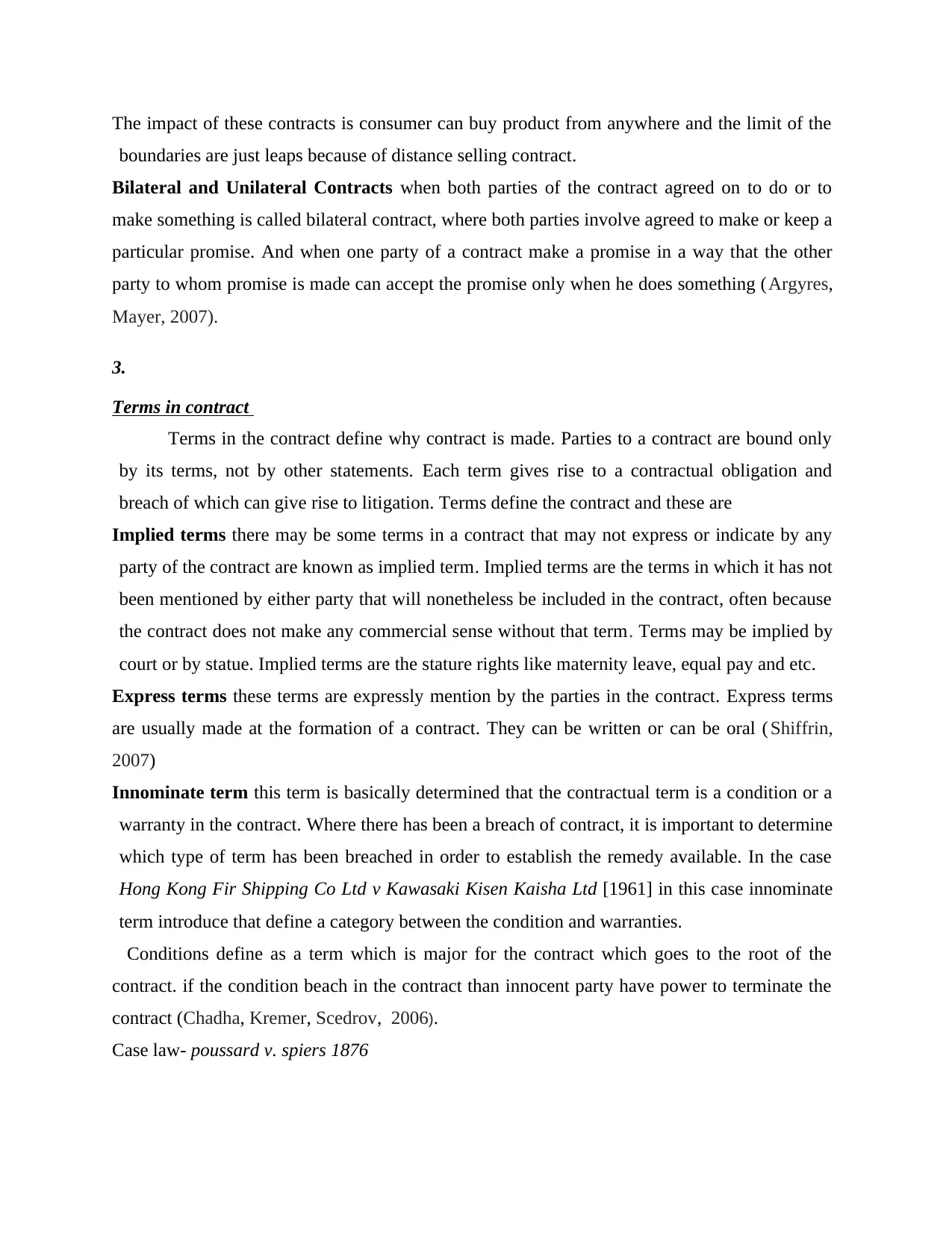
The impact of these contracts is consumer can buy product from anywhere and the limit of the
boundaries are just leaps because of distance selling contract.
Bilateral and Unilateral Contracts when both parties of the contract agreed on to do or to
make something is called bilateral contract, where both parties involve agreed to make or keep a
particular promise. And when one party of a contract make a promise in a way that the other
party to whom promise is made can accept the promise only when he does something (Argyres,
Mayer, 2007).
3.
Terms in contract
Terms in the contract define why contract is made. Parties to a contract are bound only
by its terms, not by other statements. Each term gives rise to a contractual obligation and
breach of which can give rise to litigation. Terms define the contract and these are
Implied terms there may be some terms in a contract that may not express or indicate by any
party of the contract are known as implied term. Implied terms are the terms in which it has not
been mentioned by either party that will nonetheless be included in the contract, often because
the contract does not make any commercial sense without that term. Terms may be implied by
court or by statue. Implied terms are the stature rights like maternity leave, equal pay and etc.
Express terms these terms are expressly mention by the parties in the contract. Express terms
are usually made at the formation of a contract. They can be written or can be oral ( Shiffrin,
2007)
Innominate term this term is basically determined that the contractual term is a condition or a
warranty in the contract. Where there has been a breach of contract, it is important to determine
which type of term has been breached in order to establish the remedy available. In the case
Hong Kong Fir Shipping Co Ltd v Kawasaki Kisen Kaisha Ltd [1961] in this case innominate
term introduce that define a category between the condition and warranties.
Conditions define as a term which is major for the contract which goes to the root of the
contract. if the condition beach in the contract than innocent party have power to terminate the
contract (Chadha, Kremer, Scedrov, 2006).
Case law- poussard v. spiers 1876
boundaries are just leaps because of distance selling contract.
Bilateral and Unilateral Contracts when both parties of the contract agreed on to do or to
make something is called bilateral contract, where both parties involve agreed to make or keep a
particular promise. And when one party of a contract make a promise in a way that the other
party to whom promise is made can accept the promise only when he does something (Argyres,
Mayer, 2007).
3.
Terms in contract
Terms in the contract define why contract is made. Parties to a contract are bound only
by its terms, not by other statements. Each term gives rise to a contractual obligation and
breach of which can give rise to litigation. Terms define the contract and these are
Implied terms there may be some terms in a contract that may not express or indicate by any
party of the contract are known as implied term. Implied terms are the terms in which it has not
been mentioned by either party that will nonetheless be included in the contract, often because
the contract does not make any commercial sense without that term. Terms may be implied by
court or by statue. Implied terms are the stature rights like maternity leave, equal pay and etc.
Express terms these terms are expressly mention by the parties in the contract. Express terms
are usually made at the formation of a contract. They can be written or can be oral ( Shiffrin,
2007)
Innominate term this term is basically determined that the contractual term is a condition or a
warranty in the contract. Where there has been a breach of contract, it is important to determine
which type of term has been breached in order to establish the remedy available. In the case
Hong Kong Fir Shipping Co Ltd v Kawasaki Kisen Kaisha Ltd [1961] in this case innominate
term introduce that define a category between the condition and warranties.
Conditions define as a term which is major for the contract which goes to the root of the
contract. if the condition beach in the contract than innocent party have power to terminate the
contract (Chadha, Kremer, Scedrov, 2006).
Case law- poussard v. spiers 1876
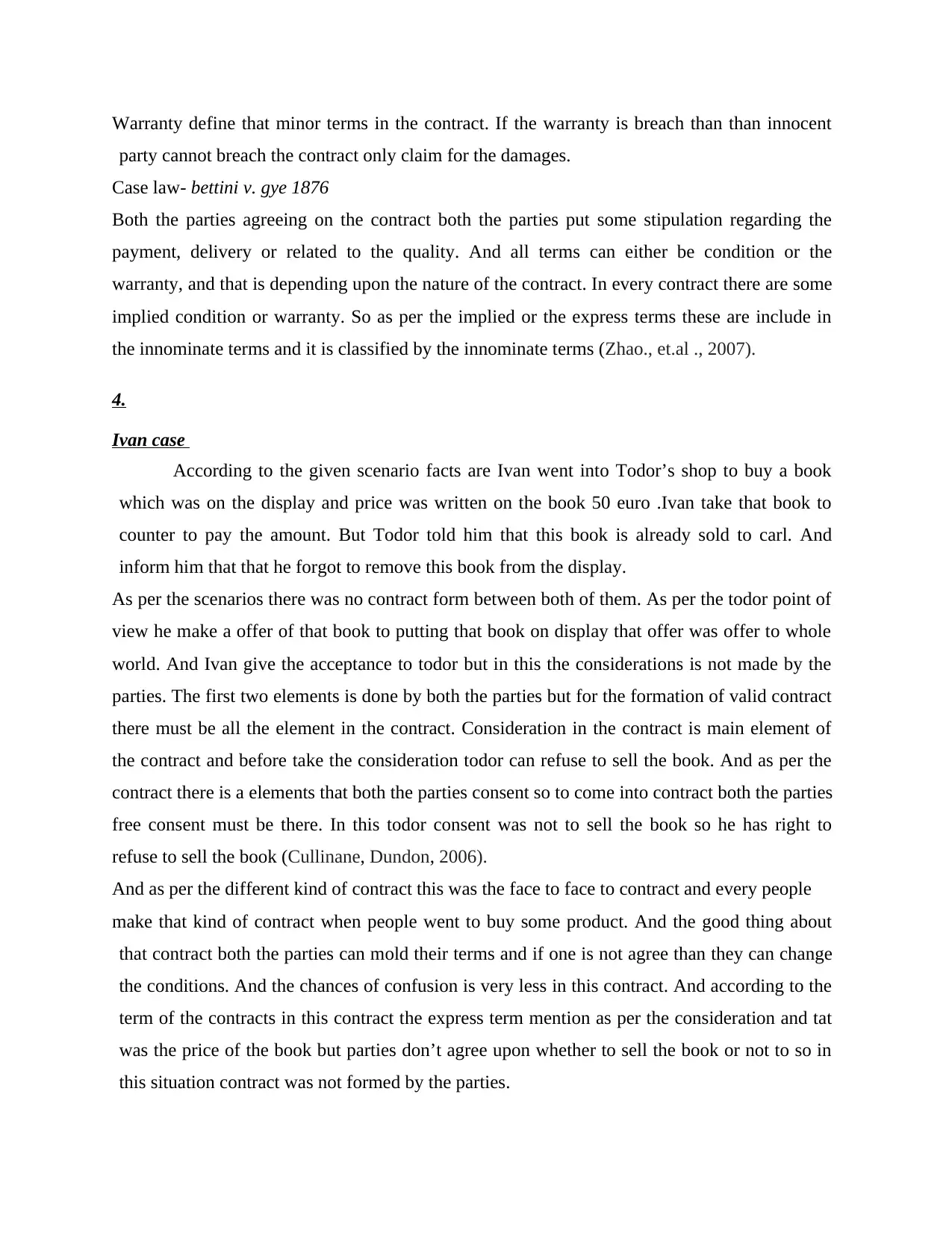
Warranty define that minor terms in the contract. If the warranty is breach than than innocent
party cannot breach the contract only claim for the damages.
Case law- bettini v. gye 1876
Both the parties agreeing on the contract both the parties put some stipulation regarding the
payment, delivery or related to the quality. And all terms can either be condition or the
warranty, and that is depending upon the nature of the contract. In every contract there are some
implied condition or warranty. So as per the implied or the express terms these are include in
the innominate terms and it is classified by the innominate terms (Zhao., et.al ., 2007).
4.
Ivan case
According to the given scenario facts are Ivan went into Todor’s shop to buy a book
which was on the display and price was written on the book 50 euro .Ivan take that book to
counter to pay the amount. But Todor told him that this book is already sold to carl. And
inform him that that he forgot to remove this book from the display.
As per the scenarios there was no contract form between both of them. As per the todor point of
view he make a offer of that book to putting that book on display that offer was offer to whole
world. And Ivan give the acceptance to todor but in this the considerations is not made by the
parties. The first two elements is done by both the parties but for the formation of valid contract
there must be all the element in the contract. Consideration in the contract is main element of
the contract and before take the consideration todor can refuse to sell the book. And as per the
contract there is a elements that both the parties consent so to come into contract both the parties
free consent must be there. In this todor consent was not to sell the book so he has right to
refuse to sell the book (Cullinane, Dundon, 2006).
And as per the different kind of contract this was the face to face to contract and every people
make that kind of contract when people went to buy some product. And the good thing about
that contract both the parties can mold their terms and if one is not agree than they can change
the conditions. And the chances of confusion is very less in this contract. And according to the
term of the contracts in this contract the express term mention as per the consideration and tat
was the price of the book but parties don’t agree upon whether to sell the book or not to so in
this situation contract was not formed by the parties.
party cannot breach the contract only claim for the damages.
Case law- bettini v. gye 1876
Both the parties agreeing on the contract both the parties put some stipulation regarding the
payment, delivery or related to the quality. And all terms can either be condition or the
warranty, and that is depending upon the nature of the contract. In every contract there are some
implied condition or warranty. So as per the implied or the express terms these are include in
the innominate terms and it is classified by the innominate terms (Zhao., et.al ., 2007).
4.
Ivan case
According to the given scenario facts are Ivan went into Todor’s shop to buy a book
which was on the display and price was written on the book 50 euro .Ivan take that book to
counter to pay the amount. But Todor told him that this book is already sold to carl. And
inform him that that he forgot to remove this book from the display.
As per the scenarios there was no contract form between both of them. As per the todor point of
view he make a offer of that book to putting that book on display that offer was offer to whole
world. And Ivan give the acceptance to todor but in this the considerations is not made by the
parties. The first two elements is done by both the parties but for the formation of valid contract
there must be all the element in the contract. Consideration in the contract is main element of
the contract and before take the consideration todor can refuse to sell the book. And as per the
contract there is a elements that both the parties consent so to come into contract both the parties
free consent must be there. In this todor consent was not to sell the book so he has right to
refuse to sell the book (Cullinane, Dundon, 2006).
And as per the different kind of contract this was the face to face to contract and every people
make that kind of contract when people went to buy some product. And the good thing about
that contract both the parties can mold their terms and if one is not agree than they can change
the conditions. And the chances of confusion is very less in this contract. And according to the
term of the contracts in this contract the express term mention as per the consideration and tat
was the price of the book but parties don’t agree upon whether to sell the book or not to so in
this situation contract was not formed by the parties.
⊘ This is a preview!⊘
Do you want full access?
Subscribe today to unlock all pages.

Trusted by 1+ million students worldwide
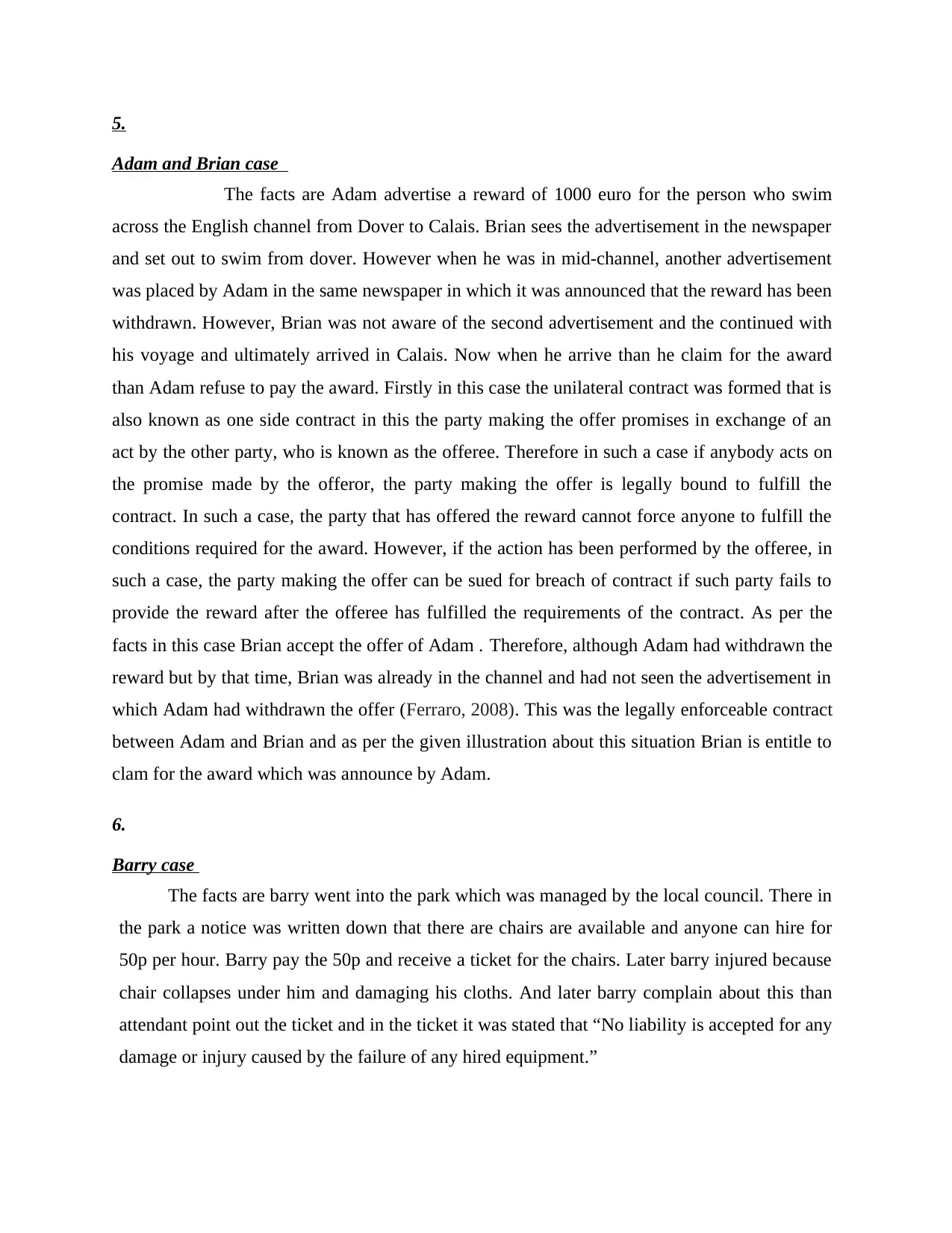
5.
Adam and Brian case
The facts are Adam advertise a reward of 1000 euro for the person who swim
across the English channel from Dover to Calais. Brian sees the advertisement in the newspaper
and set out to swim from dover. However when he was in mid-channel, another advertisement
was placed by Adam in the same newspaper in which it was announced that the reward has been
withdrawn. However, Brian was not aware of the second advertisement and the continued with
his voyage and ultimately arrived in Calais. Now when he arrive than he claim for the award
than Adam refuse to pay the award. Firstly in this case the unilateral contract was formed that is
also known as one side contract in this the party making the offer promises in exchange of an
act by the other party, who is known as the offeree. Therefore in such a case if anybody acts on
the promise made by the offeror, the party making the offer is legally bound to fulfill the
contract. In such a case, the party that has offered the reward cannot force anyone to fulfill the
conditions required for the award. However, if the action has been performed by the offeree, in
such a case, the party making the offer can be sued for breach of contract if such party fails to
provide the reward after the offeree has fulfilled the requirements of the contract. As per the
facts in this case Brian accept the offer of Adam . Therefore, although Adam had withdrawn the
reward but by that time, Brian was already in the channel and had not seen the advertisement in
which Adam had withdrawn the offer (Ferraro, 2008). This was the legally enforceable contract
between Adam and Brian and as per the given illustration about this situation Brian is entitle to
clam for the award which was announce by Adam.
6.
Barry case
The facts are barry went into the park which was managed by the local council. There in
the park a notice was written down that there are chairs are available and anyone can hire for
50p per hour. Barry pay the 50p and receive a ticket for the chairs. Later barry injured because
chair collapses under him and damaging his cloths. And later barry complain about this than
attendant point out the ticket and in the ticket it was stated that “No liability is accepted for any
damage or injury caused by the failure of any hired equipment.”
Adam and Brian case
The facts are Adam advertise a reward of 1000 euro for the person who swim
across the English channel from Dover to Calais. Brian sees the advertisement in the newspaper
and set out to swim from dover. However when he was in mid-channel, another advertisement
was placed by Adam in the same newspaper in which it was announced that the reward has been
withdrawn. However, Brian was not aware of the second advertisement and the continued with
his voyage and ultimately arrived in Calais. Now when he arrive than he claim for the award
than Adam refuse to pay the award. Firstly in this case the unilateral contract was formed that is
also known as one side contract in this the party making the offer promises in exchange of an
act by the other party, who is known as the offeree. Therefore in such a case if anybody acts on
the promise made by the offeror, the party making the offer is legally bound to fulfill the
contract. In such a case, the party that has offered the reward cannot force anyone to fulfill the
conditions required for the award. However, if the action has been performed by the offeree, in
such a case, the party making the offer can be sued for breach of contract if such party fails to
provide the reward after the offeree has fulfilled the requirements of the contract. As per the
facts in this case Brian accept the offer of Adam . Therefore, although Adam had withdrawn the
reward but by that time, Brian was already in the channel and had not seen the advertisement in
which Adam had withdrawn the offer (Ferraro, 2008). This was the legally enforceable contract
between Adam and Brian and as per the given illustration about this situation Brian is entitle to
clam for the award which was announce by Adam.
6.
Barry case
The facts are barry went into the park which was managed by the local council. There in
the park a notice was written down that there are chairs are available and anyone can hire for
50p per hour. Barry pay the 50p and receive a ticket for the chairs. Later barry injured because
chair collapses under him and damaging his cloths. And later barry complain about this than
attendant point out the ticket and in the ticket it was stated that “No liability is accepted for any
damage or injury caused by the failure of any hired equipment.”
Paraphrase This Document
Need a fresh take? Get an instant paraphrase of this document with our AI Paraphraser
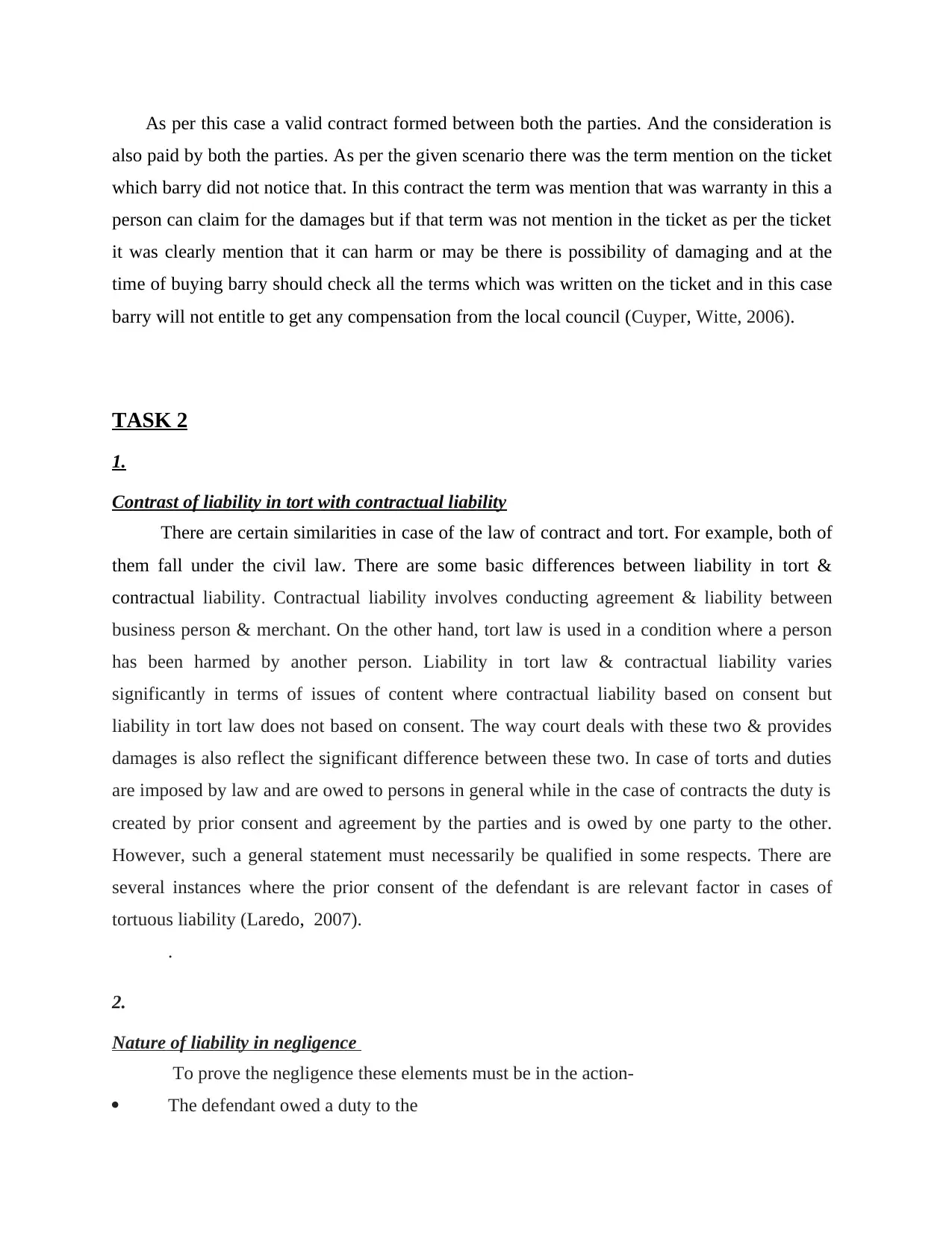
As per this case a valid contract formed between both the parties. And the consideration is
also paid by both the parties. As per the given scenario there was the term mention on the ticket
which barry did not notice that. In this contract the term was mention that was warranty in this a
person can claim for the damages but if that term was not mention in the ticket as per the ticket
it was clearly mention that it can harm or may be there is possibility of damaging and at the
time of buying barry should check all the terms which was written on the ticket and in this case
barry will not entitle to get any compensation from the local council (Cuyper, Witte, 2006).
TASK 2
1.
Contrast of liability in tort with contractual liability
There are certain similarities in case of the law of contract and tort. For example, both of
them fall under the civil law. There are some basic differences between liability in tort &
contractual liability. Contractual liability involves conducting agreement & liability between
business person & merchant. On the other hand, tort law is used in a condition where a person
has been harmed by another person. Liability in tort law & contractual liability varies
significantly in terms of issues of content where contractual liability based on consent but
liability in tort law does not based on consent. The way court deals with these two & provides
damages is also reflect the significant difference between these two. In case of torts and duties
are imposed by law and are owed to persons in general while in the case of contracts the duty is
created by prior consent and agreement by the parties and is owed by one party to the other.
However, such a general statement must necessarily be qualified in some respects. There are
several instances where the prior consent of the defendant is are relevant factor in cases of
tortuous liability (Laredo, 2007).
.
2.
Nature of liability in negligence
To prove the negligence these elements must be in the action-
The defendant owed a duty to the
also paid by both the parties. As per the given scenario there was the term mention on the ticket
which barry did not notice that. In this contract the term was mention that was warranty in this a
person can claim for the damages but if that term was not mention in the ticket as per the ticket
it was clearly mention that it can harm or may be there is possibility of damaging and at the
time of buying barry should check all the terms which was written on the ticket and in this case
barry will not entitle to get any compensation from the local council (Cuyper, Witte, 2006).
TASK 2
1.
Contrast of liability in tort with contractual liability
There are certain similarities in case of the law of contract and tort. For example, both of
them fall under the civil law. There are some basic differences between liability in tort &
contractual liability. Contractual liability involves conducting agreement & liability between
business person & merchant. On the other hand, tort law is used in a condition where a person
has been harmed by another person. Liability in tort law & contractual liability varies
significantly in terms of issues of content where contractual liability based on consent but
liability in tort law does not based on consent. The way court deals with these two & provides
damages is also reflect the significant difference between these two. In case of torts and duties
are imposed by law and are owed to persons in general while in the case of contracts the duty is
created by prior consent and agreement by the parties and is owed by one party to the other.
However, such a general statement must necessarily be qualified in some respects. There are
several instances where the prior consent of the defendant is are relevant factor in cases of
tortuous liability (Laredo, 2007).
.
2.
Nature of liability in negligence
To prove the negligence these elements must be in the action-
The defendant owed a duty to the
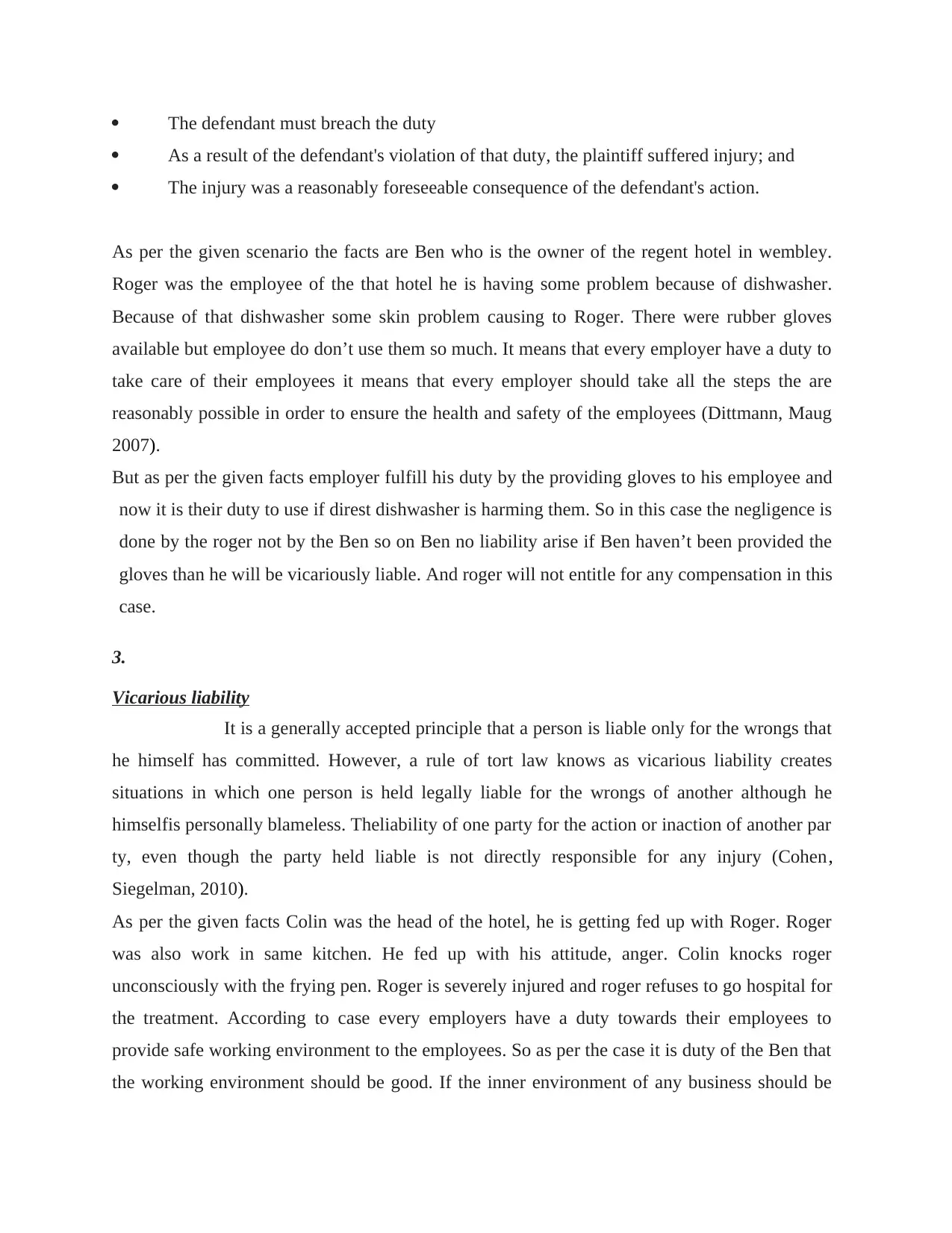
The defendant must breach the duty
As a result of the defendant's violation of that duty, the plaintiff suffered injury; and
The injury was a reasonably foreseeable consequence of the defendant's action.
As per the given scenario the facts are Ben who is the owner of the regent hotel in wembley.
Roger was the employee of the that hotel he is having some problem because of dishwasher.
Because of that dishwasher some skin problem causing to Roger. There were rubber gloves
available but employee do don’t use them so much. It means that every employer have a duty to
take care of their employees it means that every employer should take all the steps the are
reasonably possible in order to ensure the health and safety of the employees (Dittmann, Maug
2007).
But as per the given facts employer fulfill his duty by the providing gloves to his employee and
now it is their duty to use if direst dishwasher is harming them. So in this case the negligence is
done by the roger not by the Ben so on Ben no liability arise if Ben haven’t been provided the
gloves than he will be vicariously liable. And roger will not entitle for any compensation in this
case.
3.
Vicarious liability
It is a generally accepted principle that a person is liable only for the wrongs that
he himself has committed. However, a rule of tort law knows as vicarious liability creates
situations in which one person is held legally liable for the wrongs of another although he
himselfis personally blameless. Theliability of one party for the action or inaction of another par
ty, even though the party held liable is not directly responsible for any injury (Cohen,
Siegelman, 2010).
As per the given facts Colin was the head of the hotel, he is getting fed up with Roger. Roger
was also work in same kitchen. He fed up with his attitude, anger. Colin knocks roger
unconsciously with the frying pen. Roger is severely injured and roger refuses to go hospital for
the treatment. According to case every employers have a duty towards their employees to
provide safe working environment to the employees. So as per the case it is duty of the Ben that
the working environment should be good. If the inner environment of any business should be
As a result of the defendant's violation of that duty, the plaintiff suffered injury; and
The injury was a reasonably foreseeable consequence of the defendant's action.
As per the given scenario the facts are Ben who is the owner of the regent hotel in wembley.
Roger was the employee of the that hotel he is having some problem because of dishwasher.
Because of that dishwasher some skin problem causing to Roger. There were rubber gloves
available but employee do don’t use them so much. It means that every employer have a duty to
take care of their employees it means that every employer should take all the steps the are
reasonably possible in order to ensure the health and safety of the employees (Dittmann, Maug
2007).
But as per the given facts employer fulfill his duty by the providing gloves to his employee and
now it is their duty to use if direst dishwasher is harming them. So in this case the negligence is
done by the roger not by the Ben so on Ben no liability arise if Ben haven’t been provided the
gloves than he will be vicariously liable. And roger will not entitle for any compensation in this
case.
3.
Vicarious liability
It is a generally accepted principle that a person is liable only for the wrongs that
he himself has committed. However, a rule of tort law knows as vicarious liability creates
situations in which one person is held legally liable for the wrongs of another although he
himselfis personally blameless. Theliability of one party for the action or inaction of another par
ty, even though the party held liable is not directly responsible for any injury (Cohen,
Siegelman, 2010).
As per the given facts Colin was the head of the hotel, he is getting fed up with Roger. Roger
was also work in same kitchen. He fed up with his attitude, anger. Colin knocks roger
unconsciously with the frying pen. Roger is severely injured and roger refuses to go hospital for
the treatment. According to case every employers have a duty towards their employees to
provide safe working environment to the employees. So as per the case it is duty of the Ben that
the working environment should be good. If the inner environment of any business should be
⊘ This is a preview!⊘
Do you want full access?
Subscribe today to unlock all pages.

Trusted by 1+ million students worldwide
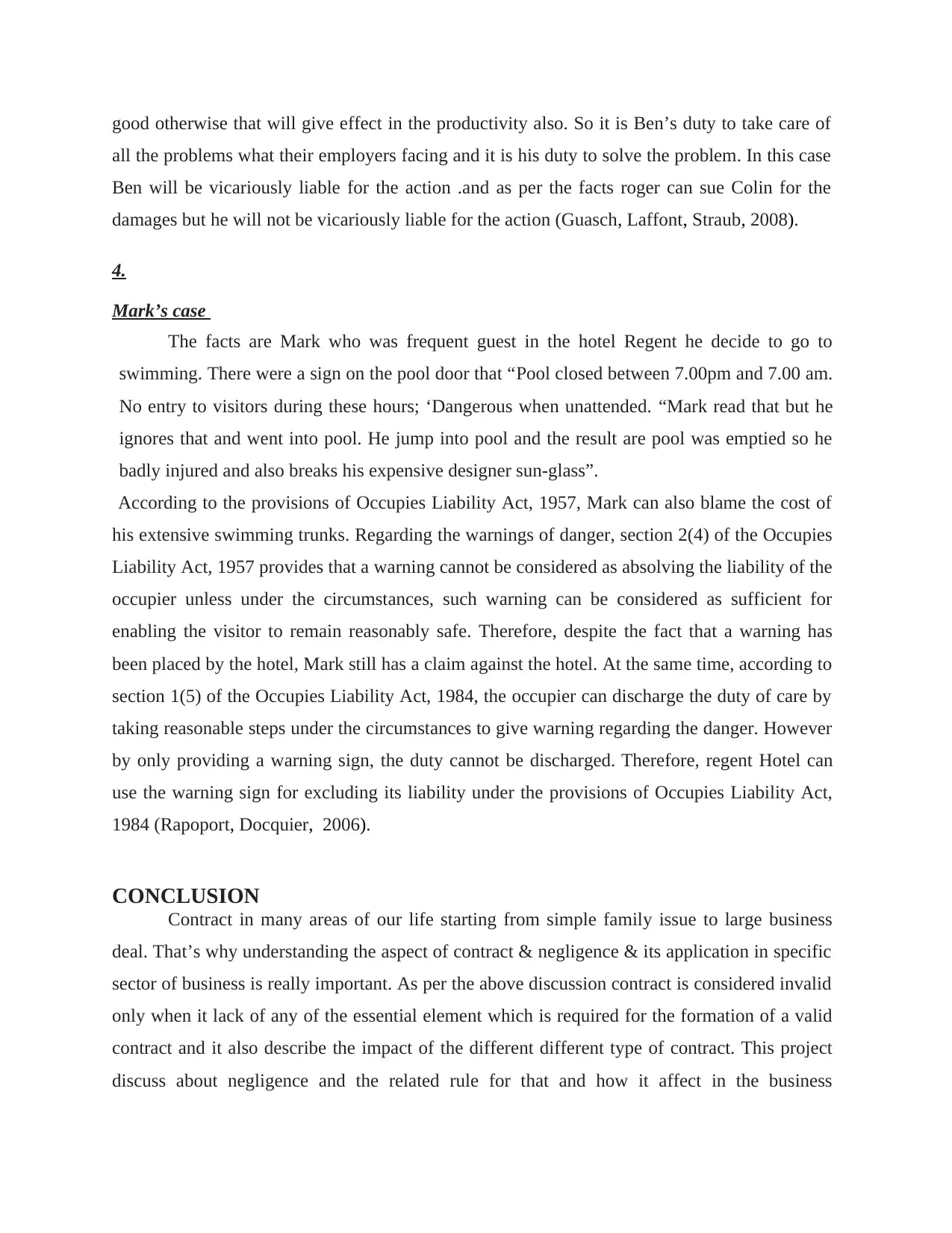
good otherwise that will give effect in the productivity also. So it is Ben’s duty to take care of
all the problems what their employers facing and it is his duty to solve the problem. In this case
Ben will be vicariously liable for the action .and as per the facts roger can sue Colin for the
damages but he will not be vicariously liable for the action (Guasch, Laffont, Straub, 2008).
4.
Mark’s case
The facts are Mark who was frequent guest in the hotel Regent he decide to go to
swimming. There were a sign on the pool door that “Pool closed between 7.00pm and 7.00 am.
No entry to visitors during these hours; ‘Dangerous when unattended. “Mark read that but he
ignores that and went into pool. He jump into pool and the result are pool was emptied so he
badly injured and also breaks his expensive designer sun-glass”.
According to the provisions of Occupies Liability Act, 1957, Mark can also blame the cost of
his extensive swimming trunks. Regarding the warnings of danger, section 2(4) of the Occupies
Liability Act, 1957 provides that a warning cannot be considered as absolving the liability of the
occupier unless under the circumstances, such warning can be considered as sufficient for
enabling the visitor to remain reasonably safe. Therefore, despite the fact that a warning has
been placed by the hotel, Mark still has a claim against the hotel. At the same time, according to
section 1(5) of the Occupies Liability Act, 1984, the occupier can discharge the duty of care by
taking reasonable steps under the circumstances to give warning regarding the danger. However
by only providing a warning sign, the duty cannot be discharged. Therefore, regent Hotel can
use the warning sign for excluding its liability under the provisions of Occupies Liability Act,
1984 (Rapoport, Docquier, 2006).
CONCLUSION
Contract in many areas of our life starting from simple family issue to large business
deal. That’s why understanding the aspect of contract & negligence & its application in specific
sector of business is really important. As per the above discussion contract is considered invalid
only when it lack of any of the essential element which is required for the formation of a valid
contract and it also describe the impact of the different different type of contract. This project
discuss about negligence and the related rule for that and how it affect in the business
all the problems what their employers facing and it is his duty to solve the problem. In this case
Ben will be vicariously liable for the action .and as per the facts roger can sue Colin for the
damages but he will not be vicariously liable for the action (Guasch, Laffont, Straub, 2008).
4.
Mark’s case
The facts are Mark who was frequent guest in the hotel Regent he decide to go to
swimming. There were a sign on the pool door that “Pool closed between 7.00pm and 7.00 am.
No entry to visitors during these hours; ‘Dangerous when unattended. “Mark read that but he
ignores that and went into pool. He jump into pool and the result are pool was emptied so he
badly injured and also breaks his expensive designer sun-glass”.
According to the provisions of Occupies Liability Act, 1957, Mark can also blame the cost of
his extensive swimming trunks. Regarding the warnings of danger, section 2(4) of the Occupies
Liability Act, 1957 provides that a warning cannot be considered as absolving the liability of the
occupier unless under the circumstances, such warning can be considered as sufficient for
enabling the visitor to remain reasonably safe. Therefore, despite the fact that a warning has
been placed by the hotel, Mark still has a claim against the hotel. At the same time, according to
section 1(5) of the Occupies Liability Act, 1984, the occupier can discharge the duty of care by
taking reasonable steps under the circumstances to give warning regarding the danger. However
by only providing a warning sign, the duty cannot be discharged. Therefore, regent Hotel can
use the warning sign for excluding its liability under the provisions of Occupies Liability Act,
1984 (Rapoport, Docquier, 2006).
CONCLUSION
Contract in many areas of our life starting from simple family issue to large business
deal. That’s why understanding the aspect of contract & negligence & its application in specific
sector of business is really important. As per the above discussion contract is considered invalid
only when it lack of any of the essential element which is required for the formation of a valid
contract and it also describe the impact of the different different type of contract. This project
discuss about negligence and the related rule for that and how it affect in the business
Paraphrase This Document
Need a fresh take? Get an instant paraphrase of this document with our AI Paraphraser

(Kindström, 2010).As per the above project thus describe that liability because some people
confused about the different liability between the tort liability and contractual liability but there
are some difference that clarify in the project.
confused about the different liability between the tort liability and contractual liability but there
are some difference that clarify in the project.

⊘ This is a preview!⊘
Do you want full access?
Subscribe today to unlock all pages.

Trusted by 1+ million students worldwide
1 out of 14
Related Documents
Your All-in-One AI-Powered Toolkit for Academic Success.
+13062052269
info@desklib.com
Available 24*7 on WhatsApp / Email
![[object Object]](/_next/static/media/star-bottom.7253800d.svg)
Unlock your academic potential
Copyright © 2020–2025 A2Z Services. All Rights Reserved. Developed and managed by ZUCOL.





